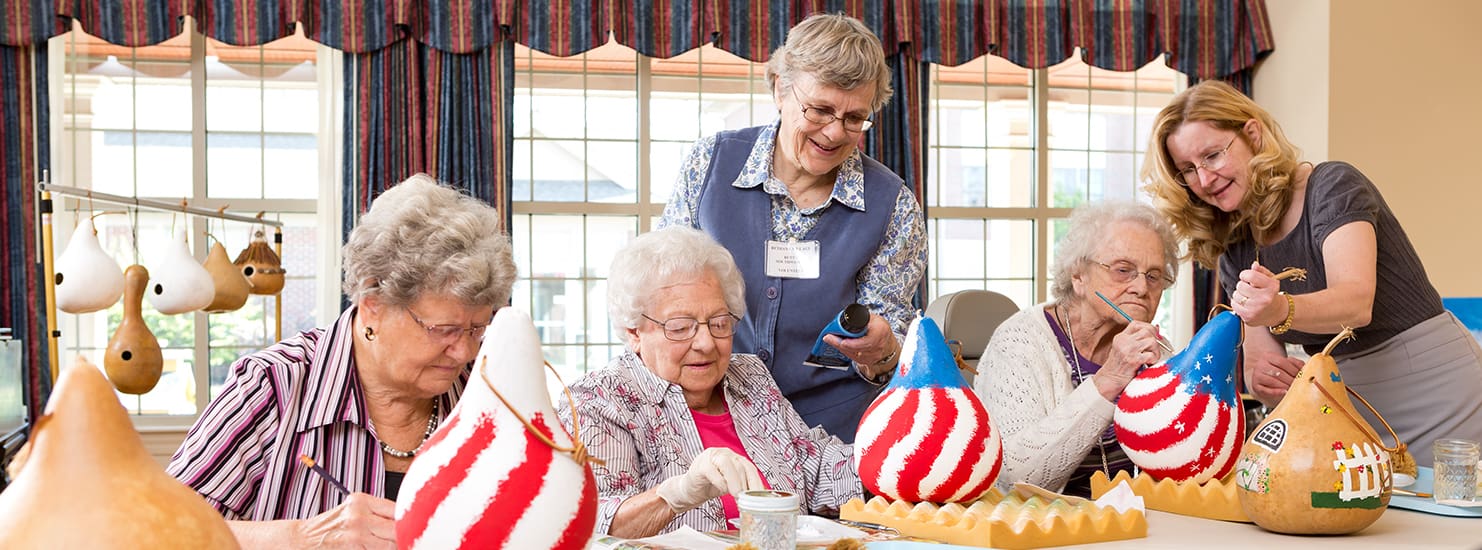Comprehensive Guide to Senior Care Options
Understanding Assisted Living and Personal Care
At Asbury Communities, we get it: acknowledging that there may come a time when we need help is a thought we’d rather avoid, and many of us have little experience with the senior care options that exist. Understanding the differences between assisted living, personal care, nursing care, and independent senior living can be complicated. All of this adds up to a lot of confusion about our choices for support as we age.
Here’s a quick primer on the scope of services available in assisted living and personal care, what type of issues require skilled nursing care and the costs associated with them. Knowing as much as possible before you or a parent needs supportive services is always the best strategy.
Typical Assisted Living Services
In a broad sense, assisted living is a lifestyle that supports an individual’s independence and strives to make it possible for residents to live with people who are as physically, socially and cognitively similar for as long as possible.
Tasks that previously required assistance – such as driving to and from appointments, cleaning, doing laundry or preparing meals – are provided for you in assisted living. Many assisted living communities offer graduated levels of services and pricing. Those include:
- Assistance with daily living tasks or the peace of mind of having attentive staff nearby
- Moderate assistance with getting dressed, eating, daily assistance with hygiene, incontinence and medication management
- If an individual requires assistive services but also has a health issue such as diabetes or an ostomy bag, or is exhibiting behaviors associated with memory loss
When you look at providing residents with the ability to age in place over the long term, assisted living often begins to look like the ideal option.
How is personal care different from assisted living?
Some states, including Pennsylvania, offer another option for long-term care called personal care. This can be a good fit for option for seniors who need assistance with activities of daily living (dressing or bathing), medication management, or memory support.
This option offers many of the same services as assisted living centers and is typically less expensive. However, personal care centers typically do not have to meet the same staffing requirements, education requirements for staff, “opt out of services” requirements, etc., just to name a few. Let’s say Mrs. Smith lives in a personal care center and is admitted to the hospital because she contracts an infection. After a few days, the hospital is ready to discharge her, but she needs IV antibiotics. A personal care home might not be able to take her back.
Seniors who require more complex, round-the-clock nursing support or are unable to safely remove themselves from danger without assistance, typically require skilled nursing care found in a nursing home.
Planning for Support as We Age
Confronting age-related decline is difficult for loved ones and the person experiencing them first-hand. Acknowledging that recurring issues may require moving to a new home is even more challenging. Perhaps the greatest challenge of all is moving during the midst of a medical crisis.
All too often, we see people who are in desperate situations – a parent has been injured and is unable to return home, a person with memory issues has gotten behind the wheel of a car and ended up lost for several hours or a relative has been found wandering outside in 20-degree weather.
Having a plan in place is imperative. Research your local aging services and long-term care communities. It is important to do this before a crisis limits your choice for the best possible care. Many assisted living centers and nursing homes have waiting lists. Finally, schedule a tour of several communities.
It’s also important to understand what senior care is covered by Medicare and Medicaid. Medicare does not cover assisted living care and only covers skilled nursing if it is following a hospital stay for rehabilitation. Medicaid will cover skilled nursing if you meet your state’s financial need guidelines, otherwise, residents must pay privately or use long-term care insurance.
Top Questions for Assisted Living Providers
If you’re conducting research into assisted living and personal care, it’s important to ask very specific questions about health services and staff expertise. Here are three key questions you should ask long-term care providers:
- What medical issues and acuity level can you treat? You want a place that will allow you or your loved one to remain there as long as possible. This is a major benefit of a CCRC. Skilled nursing and rehab services are on campus, and residents can easily move between levels of care if they have a temporary illness or injury.
- What are your staffing levels and staff training requirements? Often, the level of assistance a community can provide is linked to the presence of a RN or LPN. Ask about the state’s requirements for staff training, if it is specific to the service they’ll be providing, such as memory support, and if the facility has its own additional training.
- What services are included in the daily rate? Housekeeping, laundry and meals are services that are included in the rate for assisted living (or there is an “opt out of services” option for a small reduction in the rate). In some personal care homes, services such as laundry service would be an ancillary charge.
Five Factors to Consider When Researching Assisted Living
Knowing as much as possible about local assisted living communities before an emergency arises is the best strategy, especially if waiting lists are present. When you tour, keep these five things in mind.
- The Community’s Environment. The lobby, common areas, dining rooms and hallways should be odor-free, clean and not cluttered with unattended carts, wheelchairs and other objects. Look for residents who are out and engaged, having conversations with each other or staff or attending resident programs. Program calendars should address all the dimensions of wellness – social, physical, intellectual and spiritual – and you should see flyers promoting upcoming events.
- Staff Interactions with Residents. The key word here is dignity. Are staff members calling residents by their names and talking to them in an adult, respectful manner? Are they interacting with residents they pass in the hall in a cordial way and offering assistance to someone who looks like they may need help? Do they knock before entering someone’s room?
- Staff Credentials. Ask whether all of the community’s caregivers are credentialed, either at the geriatric nursing assistant or certified nursing assistant level and above. Staff should include registered nurses and delegating nurses, which have credentials above the RN level and provide full care management for residents.
- ‘Extra’ Charges. At some communities, all utilities, housekeeping, laundry, meals and basic care needs such as medication management are included. Some communities charge a la carte for services. For instance, housekeeping and utilities may be excluded. There may be a meal allotment. And if you require medication management, there may be an extra fee for each medication administered. Ask the admissions counselor and read the fine print.
- Understanding the Level of Need. If a parent is not able to feed themselves or are facing significant cognitive decline, they may require a more structured setting than what an assisted living community can provide. A good rule of thumb is that someone should be able to be safe for several hours on their own – to know that if there’s a fire, they need to call for assistance, or if they encounter trouble standing and proactively call someone for help before they get up.
Assisted Living and Personal Care at Asbury
At Asbury, our mission is to help you continue living the active lifestyle you’re used to, while enjoying the peace of mind that comes with having a secure plan for your future. With our assisted living services, you can get back to spending time doing what you love while receiving just the right amount of care and support you need throughout the day.
Learn more about our assisted living communities and contact us today to schedule a tour of one of our assisted living or personal care communities in Delaware, Maryland, and Pennsylvania.




